Your login information returned multiple users. Please select the user you would like to log in as and re-type in your password.
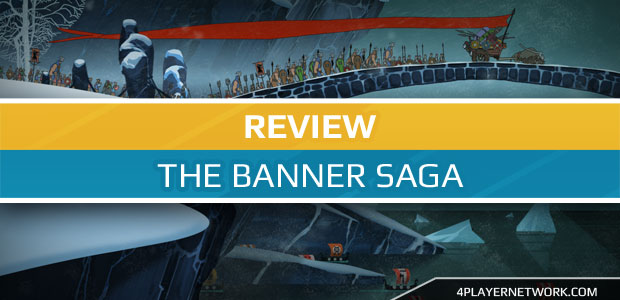
Stoic's The Banner Saga is a beautiful and atmospheric game with a powerful soundtrack. The world sets up an emotional story with incredibly high stakes, where every decision feels supremely important. The Oregon Trail-like meta structure forces the player to make tense choices at every turn. And the combat scenarios are punctuated with refreshing mechanics that innovative in a rather stagnant genre. But the true ambition of The Banner Saga lies in the way these pieces fit together. And unfortunately it's the larger puzzle that I struggle with.
Developer: Stoic
Release date: January 14, 2014
Platform(s): PC
The Banner Saga has the player in control of two different bands of people throughout the story. One on a diplomatic mission that seeks to unify both Human and Varl (the headstrong viking-like half giants) in a time that seems to be quickly approaching the end of the world. The Sun has stopped moving in the sky, and the Dredge are ravaging the land. These shadowy armored figures are relentlessly ever pursuing. The second group is simply a small band on the the run from the Dredge. Both journeys are ones of survival – in both gameplay and story.
But despite these dire circumstances, The Banner Saga is a stunningly beautiful game. Seeing your massive band of warriors and refugees stretch across the snowy landscape is breathtaking. And Stoic knows it. There are times when the game simply lingers for minutes on shots of people simply walking. The soundtrack by Austin Wintory (of Journey fame) captures both desperation and hope in these moments. This, and the gorgeous, hand-drawn art and animation often made me forget I was playing an indie game made by only a handful of people.
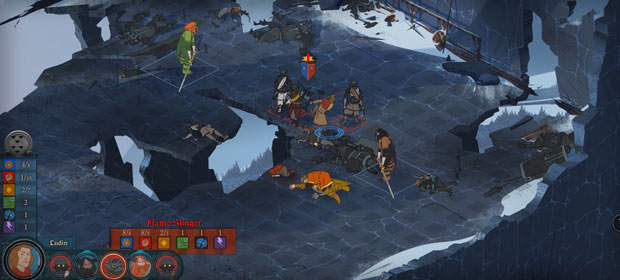
In combat is where The Banner Saga shines most. Battle scenarios are your standard turn-based "kill all enemies" on tactical grid. You won't find much in terms of elaborate objectives or geometry here, but the actual mechanics of combat are what make it great. The smartest twist is that unit health is the same as unit strength. If a unit is almost dead, they won't do much damage. It's so logical that I'm seriously surprised I haven't seen it before. Each unit also has an armor stat. You wont do much damage to an enemies health if they have a lot of armor. But when you attack an enemy unit, you are able to select between damaging their health or their armor. Whittling down a unit's armor can set up a later big attack on their health; but if a very strong enemy is about to get its turn, it might be worth to immediately start chipping away that their health. Both options have their uses, but it all depends on the situation and the turn order.
The other really clever addition is willpower. This stat is a depleatable resource in battle that acts as a way to boost your combat abilities. Let's say your attack is 1 damage shy of killing an enemy. Use 1 willpower to get that extra one point of damage. Two squares too far from reaching a pesky archer? Use 2 willpower to walk two extra steps. It a versatile stat that gives the player even more options in any given turn.
And that's what's great about the combat system in The Banner Saga. In any given turn, I have several options that are all viable. It means I can always alter my strategy and adapt to new situations. It's legitimately refreshing. I never find myself getting into a combat routine, and I feel like I'm always engaging my brain.
I also really like how the two different races you can bring into battle have such a hilarious tradeoff. The race of Varl are so much stronger than humans, that it might initially seem like a no-brainer using a full squad of these warriors. But these giants take up four squares on the grid; and I often found myself pulling my hair in frustration as I tired to maneuver around a Varl “traffic jam” while desperately trying to reach attack position on an enemy. Everything has a benefit and everything has a cost. The combat mechanics are so well tuned and balanced, that I always jumped at the opportunity for a fight.
But if there's one thing that keeps the combat from being flawless, it's an irksome design choice regarding turn order. It's that the enemy gets to alternate turns with the player regardless of how many units they have left on the field (the exception being a single enemy unit remaining). Meaning, if the player has six units, and the enemy has two, they still get to act after every move. There's a couple of problems with this. First it means that two enemy units is just as dangerous than six. In fact, if you save two more dangerous baddies for last, the fight could become much more difficult. The final battle of the game was the boss and about six other enemy units. I tried cleaning up the field before fighting the boss and failed miserably. I had a much easier time letting all of the minions wail away at my guys as I tried to kill the boss. It makes no logical sense at all. There's even an enemy unit that summons another unit when he's low on health. Due to the nature of the turn swapping, it actually makes the battles EASIER!
Also, this method of turn swapping kills the satisfying arc a battle should have. The one that starts with the feeling of being overwhelmed, then the turn for the better, and then the part where you route the enemy. There was never a satisfying mop up phase when I was doing really well in a battle. I found myself annoyed as I tried to swat the last few flies knowing I wouldn't be able to take on a second wave of enemies. That's because the last couple of assholes got to peck away at my full squad just enough before I killed them. It was occasionally maddening. This turn order issue is a bizarre design decision for the tactical game that seriously left me more puzzled than anything. Combat is fun, but I never ended a fight confident from a decisive victory. Even when I felt I made a smart choice at every turn.
But The Banner Saga isn't just a combat game. Combat is only part of a larger journey that had my band of Humans and Varl traversing the map while on the run from the Dredge. This unending pursuit of the Dredge is a perfect setup for the Oregon Trail-like adventure. And like Oregon Trail, I have supplies, people I'm trying to keep alive, and many, many difficult decisions.
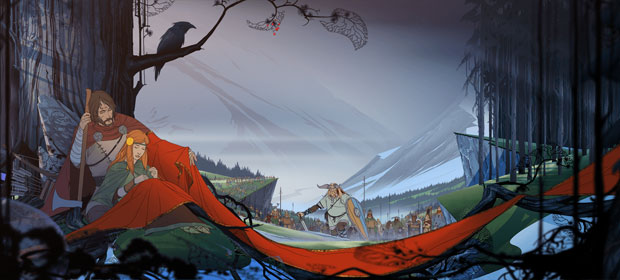
Most player choices happen during this traveling part of the game. These range from the handling of simple arguments, to major story choices. Do I let my followers pick some strange berries in hopes that I might gain a bit of food and a morale boost? Or will one of these berry munchers go crazy and end up killing my best archer? Do I knock out the young asshole king because I think he's sabotaging my peaceful mission of diplomacy? Maybe. But he's one of my best units in combat. Now what? Do I opt to spend my money (renown) on buying a magic ring for one of my combatants, or should I use this money to buy food for the group?
These are the choices that are most difficult. Difficult not just because the stakes are incredibly high, but because the outcomes ripple out to all parts of the game. A single decision can have a major impact on my combat strategy, the story, or the survival meta-game. I like that Stoic wasn't afraid to make the player suffer, but something about the design felt sloppy. And I can't help but feel a little frustrated about how these pieces of the larger puzzle came together.
The issue I had was in the seemingly random outcomes to the out-of-combat choices I was making. I constantly struggled with the results of decisions I had made, especially when I felt my choices were educated and well reasoned. And we're talking consequences that would make George RR Martin cringe. If I shoot an arrow at the enemy attacking my friend, he lives. If I try to run over and knock the enemy away, my friend dies. This is harsh, and it fits the setting, but I have a problem with how this randomness in turn now affects the tactical game. A random narrative choice (that had no real chance for logical reasoning) could have removed one of my precious units in combat. This unit could have been the backbone to all of my battle strategies. And now I'm punished because I chose one of two seemingly reasonable choices.
I'd have been okay with occasionally rolling the dice, but the fractured identity of The Banner Saga just leads to a lot of confusion. There's a huge challenge when allowing for player choice in a game that both wants to tell a story, and be a game driven by systems. If I make a bad decision in a purely narrative game like The Walking Dead or Heavy Rain, a character might die. The game isn't over, it's just the story I crafted with my choices will feel different -- and my own. I may be responsible for the death of a character I really loved, but I will still reach the end of my story. It's a sad one. But that's okay.
Alternatively, there's systematic games. In XCOM or a roguelike such as FTL, fail-states are clear. If I make a poor choices, my best unit could die. I understand this before it happens, and I understand how it effects my gameplay experience when it finally does. XCOM is also very clear about how I ultimately “lose the game” and my progress towards that fail state is not hidden from me. FTL is similar to The Banner Saga in that it also has an Oregon Trail-like structure. Even story-related choices are influenced by my desire to achieve my clearly stated final goal. I can gamble with risky situations, but I know when I should be taking these chances, and when it's probably not worth it.
But the failure state is The Banner Saga is much less clear. The story will continue regardless of my choices. Regardless if I have no warriors, refugees, food, or money left. It just keeps going. But that completely clashes with the meta-game mechanics of survival. Remember, I'm playing a game much like Oregon Trail. I can run out of everything and all that happens is I have a lower morale. And low morale only has a minor affect on my willpower stat in combat. So I trudge along with nothing. But what effect does it really have on me? I'm outnumbered in the army battles? But army battles don't even happen in the last couple of chapters of the game. So do resources not even matter? Does it not matter that people leave my group? It's all really confusing.
As far as I could tell, the only real fail state in The Banner Saga was potentially ending up in an unbeatable combat scenario. But this is a really awkward way to say “YOU LOSE”. You can keep replaying that battle with the frustration of not really knowing why you ended up there. Did I bring the wrong units into battle? Did I level up my units incorrectly? If that character hadn't died in that random choice I made in the story, would I be more successful here? Is that decision I made hours ago the reason this is the combat scenario I'm stuck on? Is this fight just supposed to be really hard? It's a really frustrating and unsatisfying way to conclude a journey about survival. It works in FTL, because that's a roguelike. There is no reloading, and that's okay, because the game is randomly generated, short, and meant to be replayed. But The Banner Saga is a long game that wants to tell a story. Maybe the developers don't want a real gameplay fail-state, and just expect players to get through the story regardless of their choices. But isn't this at odds with the whole theme of the game? It make the game feel like a jumbled mess.
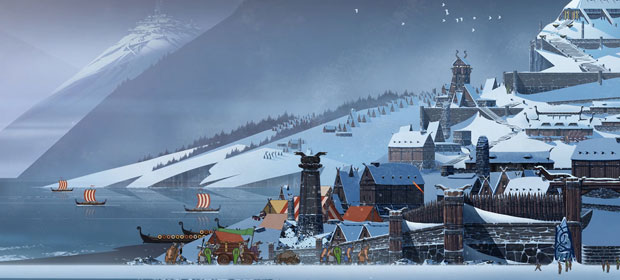
There's a very real possibility that Stoic wants me to feel desperate, and confused, and ultimately like my decisions sometimes just don't matter. It's possible that they want me to feel like outcomes are a roll of the dice. In reality, they can definitely sometimes feel that way. And that would be especially appropriate for a setting taking place during what seems like the Apocalypse.
But maybe my emotional response is just because some of the design is sloppy. Maybe I can't give credit to Stoic for every feeling I was having. I often screamed at my monitor right before a battle when I had no option to adjust my equipment or level up my units. I didn't even have the opportunity to look at a brand new unit that I may have gotten in the last story sequence. On one hand, maybe Stoic wants to simulate the feeling of unpreparedness when a battle springs out of nowhere. It might be justified in that case. But why couldn't the game have a pop up explaining just that – why I'm not given this opportunity right before a fight? One little text box could explain so much of the intent of the developer. Instead I have to chalk it up to sloppy game design.
Also, the story wants me to believe the situation is life and death – where every ration matters. But if my characters know about these towns and how far away they are, then why is the game not communicating this info to me? How am I supposed to make an informed decision about resources? If I spend too much money on leveling up my units and don't get enough food for the trip, now what? This seems like a decision with consequences, yet the game doesn't care to communicate them. It's more frustrating than the desired tension. A few smart choices in regards to clarity, and Stoic would have made it much more clear what its goal was in making the player feel a certain way. Feelings that fit with the tone of the world in The Banner Saga.
So, I punched out the drunk guy who was talking shit about me. I chose not to partner up with the shady looking soldier. I decided to level up my archer in a specific way. And I opted for more food instead of buying that powerful amulet. Did I make the right choices? I don't really know. Did my choices really even matter? I don't know. Would I have felt differently about the game had I made different choices? I don't really know. I found myself feeling confused, frustrated, and often cheated. Is this exactly how Stoic wanted me to feel? I don't know. Is the game a success? I just don't know. All I know is that I was, and still am, wrestling with how the game made me feel. Few games have made me feel the way The Banner Saga did.
But I look back on how much I enjoyed the combat despite some issues. And I remember how excited I was in-the-moment of almost every decision I made in the story and during my journey. And then I ask myself if I want to play the next Banner Saga game. And the answer comes instantly – Hell. Fucking. Yes.
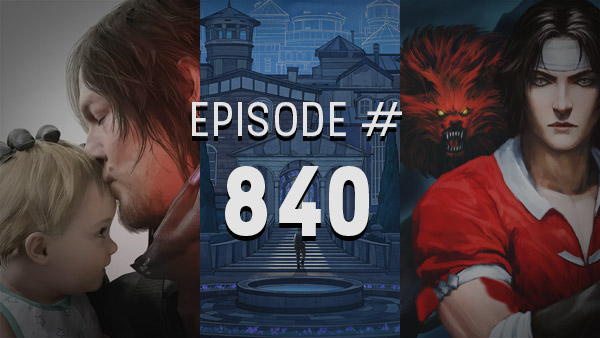
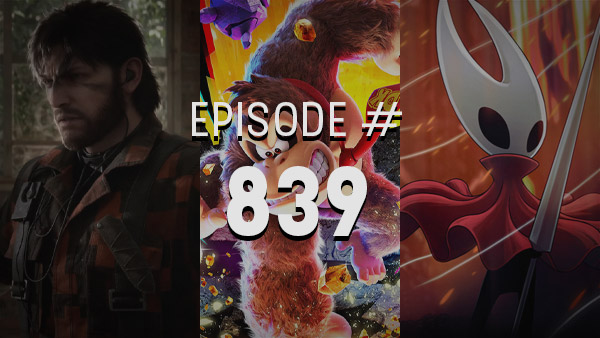
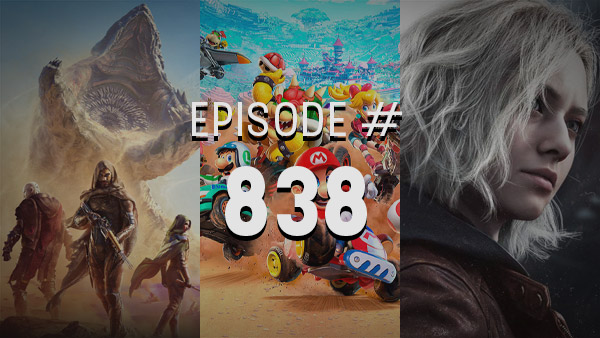
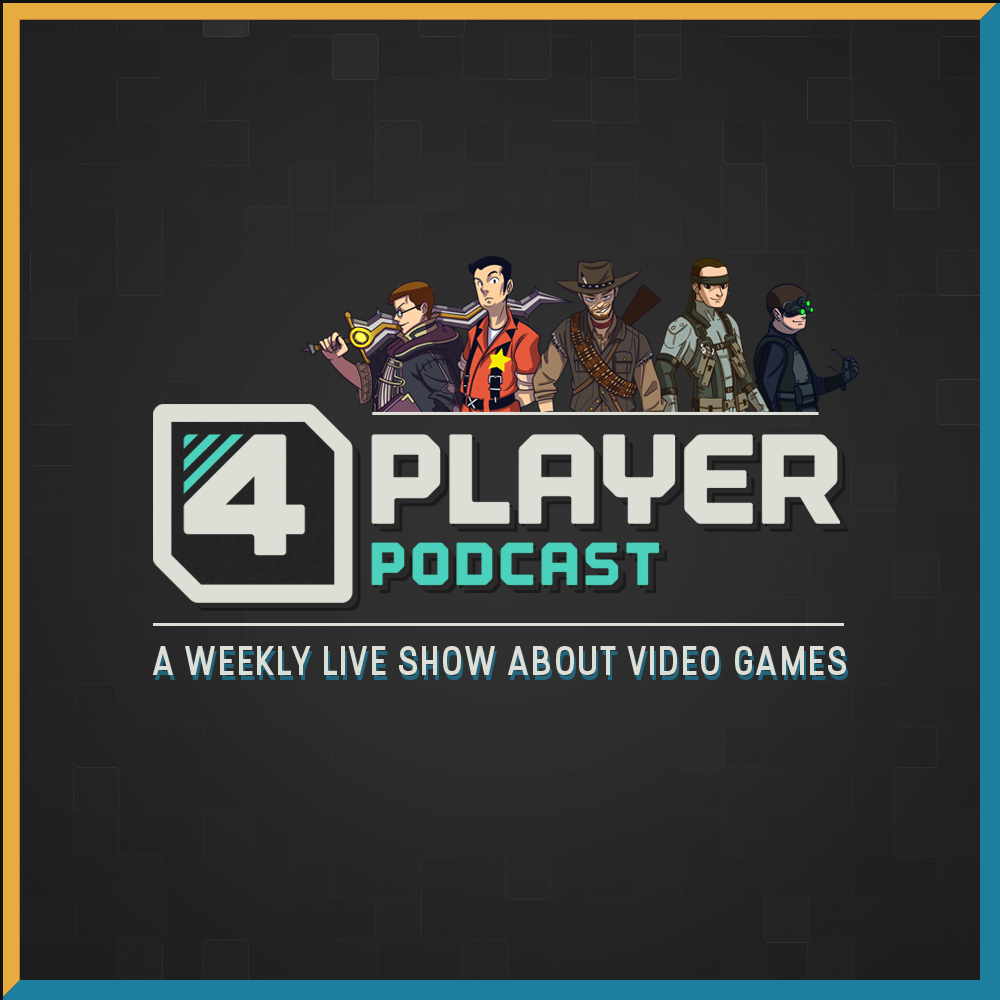
Comments
11 years, 4 months ago
Very good review Brad, its very rare to see someone systematically critique a game the way you do.
11 years, 4 months ago
Spectacular review Brad, and let me just say, to me at least, it's more of a game of struggling rather than life and death. I know that's what the game appears to tout time and time again, but the decisions you choose really are more of a situation of how your future events progress. Trusting that certain shady looking soldier really just turns into a HUGE pain in the ass later on. It's not bad, it's just how the game probably was designed. Maybe more struggle than actual survival or death.
Anyway, it was great to see you review something. You have an incredible talent.
11 years, 4 months ago
Great Review, been looking forward to this one coming out. Just finished reading it and will watch the video.
11 years, 4 months ago
Still some time on the Midweek sale on Steam. Guess I'll pick it up since I'm a fan of tactics and picking options. It's always nice, and rare, to hear a Brad review.
11 years, 4 months ago
Nice Review, Brad. Banner saga seems like it would be a highly fun game but you mentioned there were some pretty sloppy game design choices made in the game that caused you some frustration. I'm kind of on the fence about it on the moment. Maybe I'll look at some more gameplay videos to see if I'll pick it up on steam.
11 years, 4 months ago
Thought this was an excellent review Brad
11 years, 4 months ago
I honestly had no clue whether you'd give this game a 9/10 or a 5/10; when you we're playing it, it seemed like you had pretty bi-polar opinions on the game.
I bet you thought long and hard about this review, good job. Never forget Onef
11 years, 3 months ago
So is the problem with the transition between the decision-making/story-telling-choose-your-own-adventure game side and the tactics/turn-based-strategy game that the former is forced to be told regardless of choices and holds the spotlight while being linear (just cause...it's one story) but also has to affect the latter genre in a sense? It seems like it's going against the idea of a customizable TBS/RPG...
10 years, 5 months ago
It is really amazing game for children; back to school they need some relaxation. By playing this game they feel very fresh. It is quite interesting